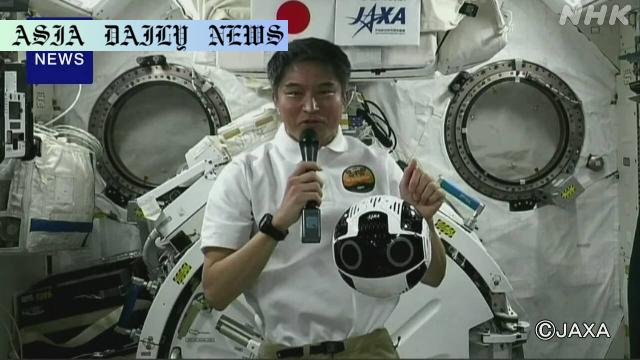ISS plays a significant role in advancing Earth’s life benefits and pioneering future space exploration through microgravity experiments.

Onishi’s Role as Commander of the ISS
Japanese astronaut Onishi Takuya has made significant strides in advancing the role of the International Space Station (ISS) in improving life on Earth and exploring the vast frontiers of space. Onishi, who assumed the role of ISS commander, is in the midst of his second long-term mission aboard the spacecraft. This opportunity allows him to guide a new generation of astronauts and demonstrate the value of microgravity environments for scientific and technological breakthroughs. His focus on mentoring four rookies ensures the talents and insights developed through this mission will resonate into future space endeavors.
The ISS is a hub of innovation, especially in areas where Earth’s gravitational pull limits the scope of scientific research. As Onishi noted during an interview with Japanese media, microgravity provides conditions that unlock new possibilities not achievable on Earth. Among the many experiments conducted on the ISS, some are dedicated to uncovering medical advancements, technological innovations, and materials that could transform daily life.
The Role of Microgravity in Research
Microgravity holds the key to unique phenomena that cannot be replicated on Earth. Being free from the constraints of gravity allows scientists to study concepts like fluid behavior, material properties, and biological processes in new ways. Experiments conducted in such an environment have profound implications on both theoretical science and practical applications. For instance, pharmaceutical research on protein folding conducted in microgravity has already opened pathways to disease treatment breakthroughs.
Beyond health-related experiments, the ISS actively engages in improving technologies for space exploration. The capability to develop more efficient life support systems, test spacecraft designs, and gather empirical data for future missions is unmatched. Onishi recognizes that these efforts not only create a blueprint for futuristic science fiction-like space travel but also circle back to enable better solutions for Earth-based challenges, underscoring the reciprocal nature of ISS research and technology transfer.
Preparing the Next Generation of Leaders
Perhaps one of Onishi’s most critical contributions during his time on the ISS is creating a legacy of leadership that empowers others. Recognizing the need to ensure knowledge and skills are seamlessly passed to the next wave of astronauts, Onishi prioritizes team coordination, mentorship, and fostering a sense of responsibility among his peers. The context of his mission becomes clearer as he awaits the arrival of four private astronauts, expanding the ISS’s collaborative network, and prepares to transition leadership duties to fellow Japanese astronaut Yui Kimiya.
This flow of knowledge exemplifies how ISS missions are about nurturing expertise and ensuring long-term sustainability for humanity’s space exploration ambitions. By doing so, Onishi affirms the value of establishing camaraderie while simultaneously leading the charge for dynamic progress through leadership that is as forward-thinking as it is grounded in responsibility.
The Future of ISS and Japan’s Space Ambitions
The relevance of Onishi’s mission underlines Japan’s increasing importance in global space exploration. As the nation aims to expand its footprint within this domain, astronauts like Onishi are serving as ambassadors of innovation and pioneers for future partnerships among international stakeholders. Such missions strengthen cooperative dialogues on scientific resource-sharing, cross-border missions, and even future space colonization programs. Japan’s steady rise in the space race illustrates the potential of how focusing on strategic growth and collaboration can position a nation as a key player on the global stage.
In addition, Yui Kimiya’s upcoming long-term mission builds on the foundation laid by Onishi, ensuring continuous representation and influence in ISS projects. With Japan consistently contributing to ISS’s goals, their efforts reflect deep-rooted values of perseverance, exploration, and teamwork. Future missions could potentially expand Japan’s technological arsenal and cement its status not only in Earth’s orbit but also in the trajectory of interplanetary travel.
Commentary
The ISS as an Instrument of Both Science and Humanity
The resounding message from astronaut Onishi Takuya’s work aboard the ISS is clear: unity and scientific curiosity can drive real change both in space and here on Earth. Microgravity represents a unique playground for discovery. Scientists and astronauts harness this element by making strides in medicine, material science, and environmental technology — promising impacts that could trickle down to everyday life. The ISS is more than a space station; it’s a beacon of possibility bridging cultures, disciplines, and aspirations, which unites the global community under the banner of collaborative progress.
Preparing New Generations: A Vital Responsibility
Onishi’s dedication to mentoring rookie astronauts highlights a deeper truth about the space program’s long-term sustainability. Just as researchers pass on theoretical contributions to subsequent generations, experienced astronauts impart an ethos of perseverance, innovation, and safety to their younger counterparts. This mentorship is critical not only to ensure operational safety but also to inspire confidence and ambition in those who will lead missions years from now. There’s a poetic symmetry in this — the ISS symbolizes humanity’s leap into the unknown, and with it, the onus to push knowledge boundaries further for future beneficiaries.
Japan’s Developing Space Legacy
Japan’s evolving role within space programs is increasingly uplifting and inspiring. By directly contributing impactful leadership figures like Onishi and Yui, the nation is not just showcasing its technological prowess but also embracing a mindset of shared human progress. This focus on mentorship, research, and practical applications creates a roadmap for younger countries aspiring to make their mark in space exploration. Watching Japan’s national program flourish within this collaborative ecosystem paves the way for how middle-power nations might feasibly find their niche as pivotal players in globalized science projects.
Their efforts steadily remind us that space exploration isn’t confined to any one country; it is an endeavor for all of humanity. As privatization expands access and lowers barriers to space, these roles will become all the more critical for ensuring harmony between various entities competing for limited cosmic resources while preserving the collaborative spirit embodied by the ISS.


